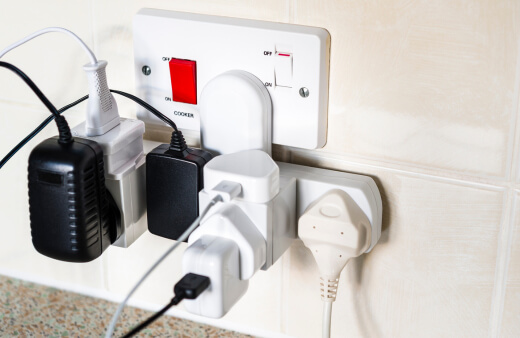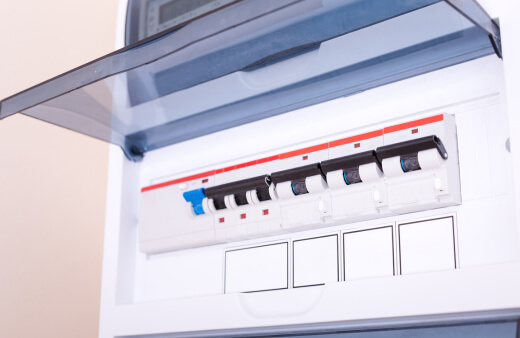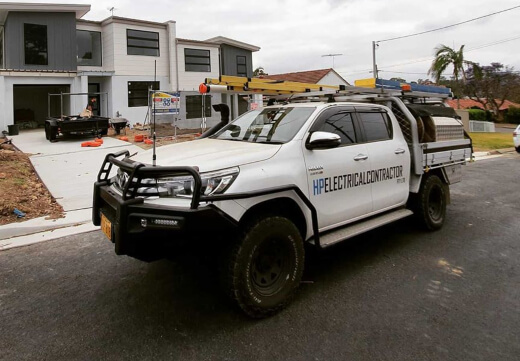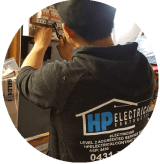
Sydney’s cityscape is adorned with many charming older homes, each with their own unique story to tell. However, these houses often come with aged electrical systems that can pose safety risks.
As Level 2 electricians at HP Electrical Contractor, we see first-hand the importance of maintaining electrical safety in Sydney’s older homes.

Electrical Safety Concerns in Older Homes
Houses built in the previous century were designed for a different era’s electrical demand. Most older homes weren’t designed to handle the electrical load of modern appliances and devices.
Over time, outdated wiring, inadequate electrical panels, and a lack of safety devices like circuit breakers can increase the risk of electrical fires and shocks.
Older homes often have less electrical outlets, prompting residents to overuse extension cords or multi-outlet converters. This practice can lead to overloaded circuits, overheating, and potentially, electrical fires.
Therefore, one of the most important steps in ensuring electrical safety is to update these systems to accommodate modern electrical demands.
Key Electrical Safety Concerns in Older Homes
Outdated Wiring Systems
In Sydney, many older homes may still be equipped with their original wiring, which can lead to safety concerns. Over time, traditional wiring materials can deteriorate or become unfit for the electrical loads of today’s technology-driven households.
Australian houses built in the 190s and earlier might contain outdated and potentially hazardous wiring systems.
One such system is TPS and Tough Rubber Sheath (TRS) wiring, which were common from the 1960s until the mid-1980s. These wiring systems can also degrade over time and pose a risk.
Then there’s Vulcanised Indian Rubber (VIR) wiring. VIR, used extensively until the 1960s, has a rubber insulation that can break down over time, exposing bare wires.
Furthermore, lead sheathed wiring, also found in homes built before the 1960s, presents its own set of problems. Over time, the lead sheath can corrode, especially in moist conditions, leading to potential short circuits or even fires.
Therefore, if your older home still uses any of these old wiring systems, it’s essential to consider an upgrade. This can help ensure your electrical system is safe, reliable, and up to the task of powering your modern lifestyle.
Insufficient Electrical Panels
In the earlier decades of Australian home construction, the electrical load requirements were significantly lower than they are today. With fewer electrical appliances and simpler lifestyle needs, the electrical systems installed in these homes were designed to handle a much lower load.
This is especially true in homes equipped with single-phase power, a standard in older Australian residences.
Single-phase power involves a single alternating current (AC) that fluctuates in magnitude and changes direction periodically. While it may have been adequate in the past, it often falls short of meeting the electrical demands of a modern home.
Today, many homes are equipped with a multitude of high-powered appliances such as air conditioners, electric heaters, home theatres, and more. This increased load can strain older, single-phase electrical systems, leading to issues such as frequent circuit breaker tripping or even electrical fires.
To overcome these limitations and ensure safe and efficient power distribution in your home, upgrading to a modern electrical panel, or more specifically, upgrading to a three-phase power system might be necessary.
A three-phase power system utilises three AC waveforms, operating in a sequence to ensure there is always a constant flow of power. This type of system can handle higher loads, reducing the chances of overloading your circuits and offering improved efficiency and safety.

No Residual Current Devices (RCDs)
Older homes may lack essential safety devices such as Residual Current Devices (RCDs) or safety switches. RCDs are designed to prevent serious electrical shocks by rapidly disconnecting the power when they detect a leakage current.
They have been mandatory in all new and upgraded electrical installations in Australia since 1991. If your older home doesn’t have RCD protection, adding these devices during an electrical upgrade is vital.
Upgrading your electrical panel and introducing a three-phase power system, if required, is a task best left to professionals. As Level 2 Electricians, HP Electrical Contractor is qualified to handle such upgrades, ensuring your home meets the current Australian electrical safety standards.
So, if you live in an older home in Sydney, consider getting your electrical system reviewed to ensure it can safely meet your modern power needs.
Lack of Ground-Fault Circuit Interrupter (GFCI) Outlets
GFCI outlets are designed to cut off power when they detect a difference in the amount of electricity passing through the hot and neutral wires, reducing the risk of shock.
They’re particularly important in areas where water is present, such as bathrooms, kitchens, and laundry rooms. If your home doesn’t have GFCI outlets, it may be time to have them installed.

The Role of Level 2 Electricians in Ensuring Electrical Safety
As Level 2 electricians, we’re equipped with the knowledge and skills necessary to tackle the unique challenges presented by older homes. We can provide comprehensive safety checks and upgrades for your home’s electrical systems.
This includes wiring upgrades, 3-phase power upgrades, installing RCDs, installing grounding and safety inspections.
Call Us for Your Electrical Safety Needs
Ensuring electrical safety in older homes in Sydney is a complex task that requires professional expertise.
As Level 2 electricians at HP Electrical Contractor, we have the skills and knowledge necessary to keep your older home’s electrical systems running safely and efficiently. Don’t hesitate to reach out to us for your electrical safety needs.

